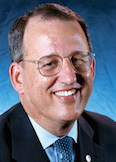UNC Tomorrow — Began Yesterday
Posted on March 15, 2008
Doug Dibbert ’70
“UNC Tomorrow begins today. “These are the closing words of a compelling video capturing 11 community listening forums conducted last fall by the UNC Tomorrow Commission and attended by an estimated 2,700 North Carolinians. Between us, Tar Heel Network Chair Tom Lambeth ’57 and I attended 10 forums. At each, a video was shown that conveyed interesting and sobering facts, including:
- In 2006, Charlotte, the Triangle and the Triad accounted for nearly 62 percent of the state’s population and 64 percent of all N.C. jobs.
- In the past 15 years, the state’s Hispanic population has grown almost 600 percent.
- By 2014, North Carolina will need an additional 41,000 nursing professionals, 34,000 teachers, 23,000 computer and technology professionals, 10,000 accountants and auditors and 3,300 social workers. The state will need 400,000 new workers with at least a bachelor’s degree; the state’s public and private colleges and universities are expected to produce 254,000 of those.
- Out of every 100 eighth-graders, 58 graduate from high school, 38 attend college, 28 return for a second year and 18 graduate from college.
- By 2017, 80,000 more students are expected to be enrolled on UNC System campuses.
- Also by 2017, 30,000 more students are expected to graduate from public high schools, and 22,000 of them are expected to be Hispanic.
Conceived by UNC System Board of Governors Chair Jim Phillips ’79 and UNC System President Erskine Bowles ’67, the UNC Tomorrow Initiative is determining how the system can better identify and address the state’s challenges and opportunities. At each event, Bowles and Phillips affirmed that “the outcomes of UNC Tomorrow will guide and shape current and future priorities, resource allocations, existing and future programs, and strategic plans and missions of the University System.”
Commission members and Bowles visited each campus in advance of the forums; after they were held, nearly 1,000 faculty, staff and students attended one of 11 faculty forums, and approximately 6,700 people completed an online survey. Among the commission’s findings are:
- System campuses should promote increased partnerships among campuses and with international universities.
- Campuses should increase access to higher education for all North Carolinians, particularly underserved regions and populations.
- The system, the N.C. Community College System, the N.C. Board of Education and the state’s private colleges and universities should continue to work closely together to develop a more seamless relationship.
- Campuses should be more actively involved in addressing the shortage of science and math teachers and in helping lower the high school dropout rate.
Many at Carolina have been involved with this initiative for nearly a year. Mike Smith ’78 (JD), vice chancellor for engagement and dean of the School of Government, serves as campus liaison; faculty members Jim Johnson and Tom Ricketts ’70 serve on the UNC Tomorrow Scholars Council; and Norma Houston ’86, on loan from the School of Government, is director of UNC Tomorrow. Under the leadership of Executive Vice Chancellor and Provost Bernadette Gray-Little, faculty from across campus are working now on how our campus can best address the priorities outlined in the report.
Serving and addressing North Carolina’s challenges has long been the enthusiastic focus of our University. For many years, we have partnered with other campuses, and recently the School of Medicine announced plans to enlarge the entering class while collaborating with medical centers in Charlotte and Asheville. Our dental school is expanding and working with East Carolina University to establish a new school in Greenville. UNC and ECU also will be working together to help cancer patients in Eastern North Carolina.
The Area Health Education Center Program, launched at Carolina in 1972, coordinates with medical schools at ECU, Duke and Wake Forest to bring training and care through 10 AHEC centers across North Carolina. Our pharmacy school is working with Elizabeth City State to provide North Carolina with more pharmacists. UNC and NCSU marine sciences faculty helped launch the marine sciences program at UNC-Wilmington.
Carolina’s statewide focus is a rich part of our history and remains central to our mission, with many more initiatives involving the schools of nursing, public health, dentistry, medicine, pharmacy, social work, government, law, education, information and library science, journalism and mass communication, business, the College of Arts and Sciences, and our centers and institutes. The UNC Tomorrow Initiative is appropriately insisting that all UNC System campuses work together and reaffirm our commitment to addressing 21st century challenges. In Chapel Hill, UNC Tomorrow began yesterday.
Yours at Carolina,

Douglas S. Dibbert ’70
